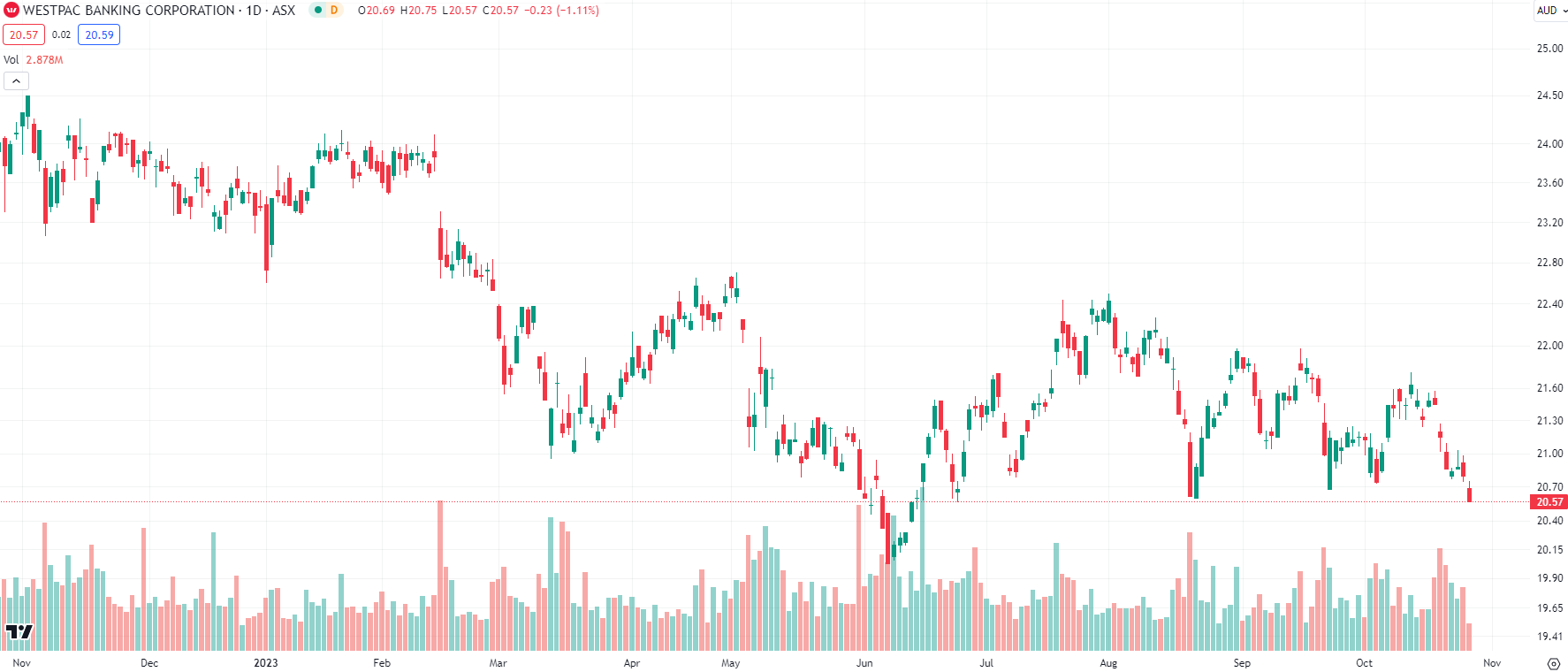Is the $173m Westpac impairment something investors need to worry about?
![]() Nick Sundich, October 27, 2023
Nick Sundich, October 27, 2023
Not for the first time this decade, investors awoke on Thursday to the news of a $173m Westpac impairment. Westpac shares did not fluctuate much yesterday, but they are down over 10% in 2023. What has the company done to deserve the impairment and share price decline?

Westpac (ASX:WBC) share price chart, log scale (Source: TradingView)
What is an impairment
First, let’s recall what an impairment is. Companies impair assets when the carrying value of those assets on the company’s balance sheet is greater than the fair market value of such assets. This situation can occur due to a variety of reasons, such as economic downturns, changes in technology, changing consumer tastes and preferences, new laws or regulations, or other external factors. Companies must assess their assets regularly and compare the carrying value with the fair market value to determine if an impairment exists. If an impairment is found then it must be recorded to accurately reflect the financial position of the company.
It is important to note that accounting law requires the impairment to be permanent – in other words it cannot be reversed. By recording impairments, companies are able to report accurate and reliable information about their financial condition. Impairments must be distinguished from write-offs or depreciation. A write-off occurs when the assets is unusable – for instance, if a motor vehicle is involved in a major crash that makes it unusable.
A depreciation is a reduction in the value of the asset, but it is expected reduction that occurs in the ordinary course of business (i.e. wear and tear). An impairment occurs unexpectedly and occurs when the gap between the carrying value of the assets and the market value is significant. An asset’s market value would inevitably account for depreciation but not for the impairment.
Goodwill is the most commonly impaired asset
One of the most common assets to be impaired is goodwill, but others can be too. Goodwill is a controversial asset because it is difficult to measure. For this reason, while it can be written down or impairment, it cannot be increased except when acquisitions occur.
If a company impairs goodwill, it may be a sign that an acquisition that has not done as well as anticipated and will result in the impairment of other assets. This was the case with Bank of Queensland (ASX:BOQ) earlier this year.
An impairment will reduce a profit but not EBITDA and this is why companies like EBITDA, because it makes earnings look higher than they really are and disregard depreciation, amortisation, impairments and interest just because they are not part of the core business and the latter 3 aren’t a cash expense. EBITDA is irrelevant for banks, however, because interest is a bank’s earnings.
Why was there a Westpac impairment?
On to Westpac’s latest write down that was unveiled on Thursday morning and was estimated to reduce net profit by $173m. This was due to several one-off items including:
- An increase in provisions for customer refunds, repayments, associated costs and litigation including costs associated with the one-off levy for the Commonwealth’s Compensation Scheme of Last Resort
- Restructuring costs associated with organisational simplification and the discontinuance of specialist businesses
- The write-down of assets and costs related to closing branches
- Unrealised fair value gains and losses on economic hedges
Mitigating the impact on Westpac’s profit was the $256m profit made from the sale of its Advance Asset Management business.
Is this a big deal?
In and of itself, probably not. But we would urge investors in Westpac (and all other consumer bank stocks for that matter) to be wary as interest rates now look to stay higher for longer and may even be increased further before this calendar year is out. The mortgage wars have not been as kind as you might expect for the big banks. Margins have been hit because consumers are shopping around for better deals and some still remain on ultra-cheap rates.
Consensus estimates for Westpac still expect a $6.6bn profit for FY23 which would be roughly in line with FY22. As for what dividend will be paid, it is anyone’s guess until the nation’s oldest bank unveils its formal results next month.
What are the Best ASX Stocks to invest in right now?
Check our buy/sell tips on the top ASX stocks
Blog Categories
Get Our Top 5 ASX Stocks for FY25
Recent Posts
Kamala Harris stocks: If Joe Biden’s VP wins the White House in 2024, which stocks will win?
With the US Presidential election now certain to be a Kamala Harris v Donald Trump showdown, we’ve looked at so-called…
South32 (ASX:S32): Is it the dark horse amongst ASX 200 miners or have cyclones and commodity prices hit it too hard?
South32 (ASX:S32) began life as a spinoff from BHP back in 2015, capitalised at $9bn. In mid-2024, it is capped…
Here’s why drug reimbursement is so important for ASX healthcare stocks
Let’s take a look at the concept of drug reimbursement, something that is crucial for ASX healthcare stocks looking to…



